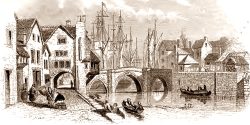
Thompsons, the Bridgwater iron mongers was an institution in the town for over two centuries and was owned and run by only two families in that time.
THE OWNERS OF THE FIRM
Joseph Thompson 1778-1855
He was born at Shaftsbury, Dorset on 4 November 1778, a son of Joseph and Hester Thompson. His father was a mariner. By his twenties he was established as an ironmonger in Bridgwater. Pigot’s Directory of 0000 shows it was on Cornhill. He married in 1807 to Anne Clark (1788-1876) a daughter of Thomas and Mary Clark of Street. She was a sister of John and Thomas Clark of Bridgwater. They had eleven children, nine of whom survived to adulthood. He was a committed Friend, and often represented the Bristol and Somerset Quarterly meeting to the Yearly meeting in London. He died in Bridgwater on 7 February, 1855. Milligan, p 437
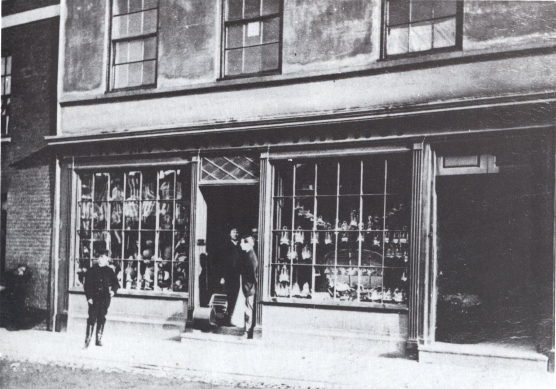

Francis James Thompson. 1813-1896
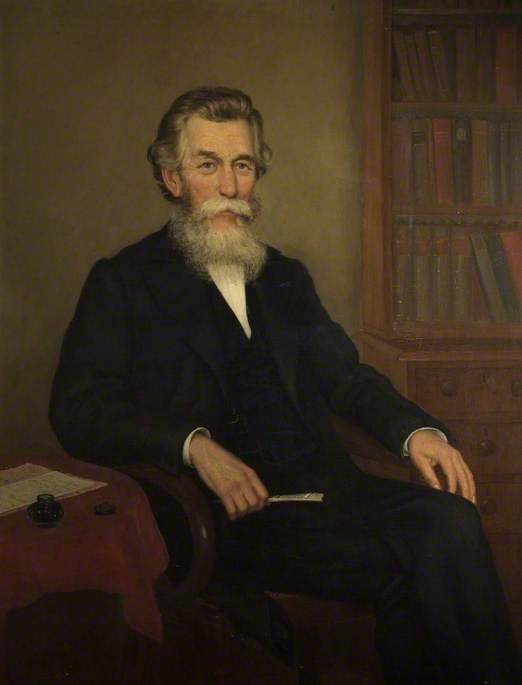
He was a son of Joseph Thompson and Anne Clark and was born in Bridgwater on August 1813. He joined the business at the age of 15. He married Rebecca Stephens (1814-1893) of Bridport, in 1836. They had eleven children, one of whom died in infancy.
He was a committed Teetotaller for all his life. He was committed Friend, and ministered frequently, but was (what was known at the time as) Gay Friend and impatient with some Quaker tradition, such as Plain Speaking – the use of Thee and Though, and the use of numbers instead of days the week: First Day, Second Day, etc.. He was evangelical in outlook, and did welfare work among the poor of the town. He supported the local revival meetings arranged by the Earl of Caven and Baron Radstock. He was active in supporting the repeal of the Contagious Diseases Act (achieved 1886). These acts had criminalised prostitution, but not those who resorted to it, so were held to be unjust. He was Liberal in politics, was mayor in 1883, alderman and later a County Councillor. He was active in supporting the local School Board, and the establishment of a Free Library for the town, which preceded the Carnegie Library on Binford Place. Milligan, p 435
His later years were marred by ill-health and he died at Hamp Green on 30 December 1896.
The business was on Cornhill, and the family (with some apprentices) lived over the shop. The family moved to a house in Huntworth in 1849, and finally to Hamp Green in 1857.
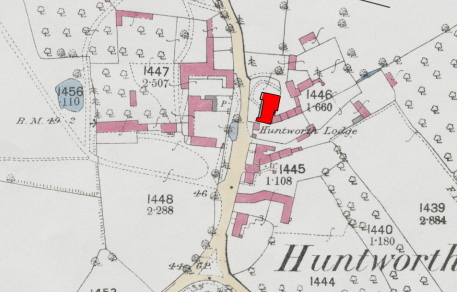
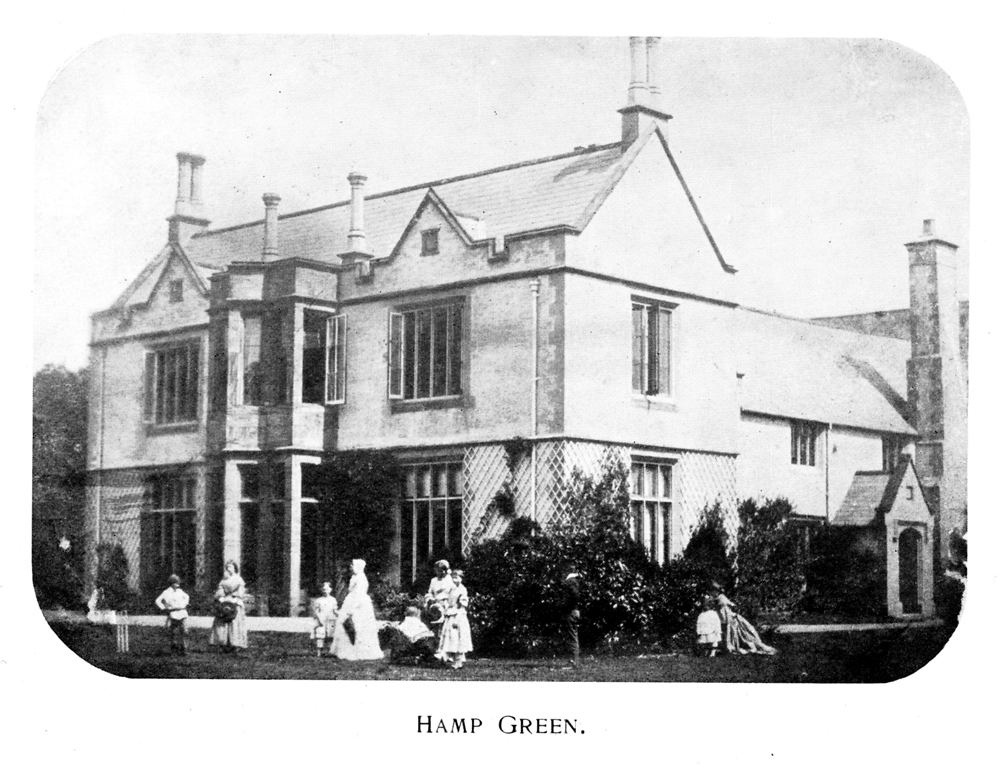
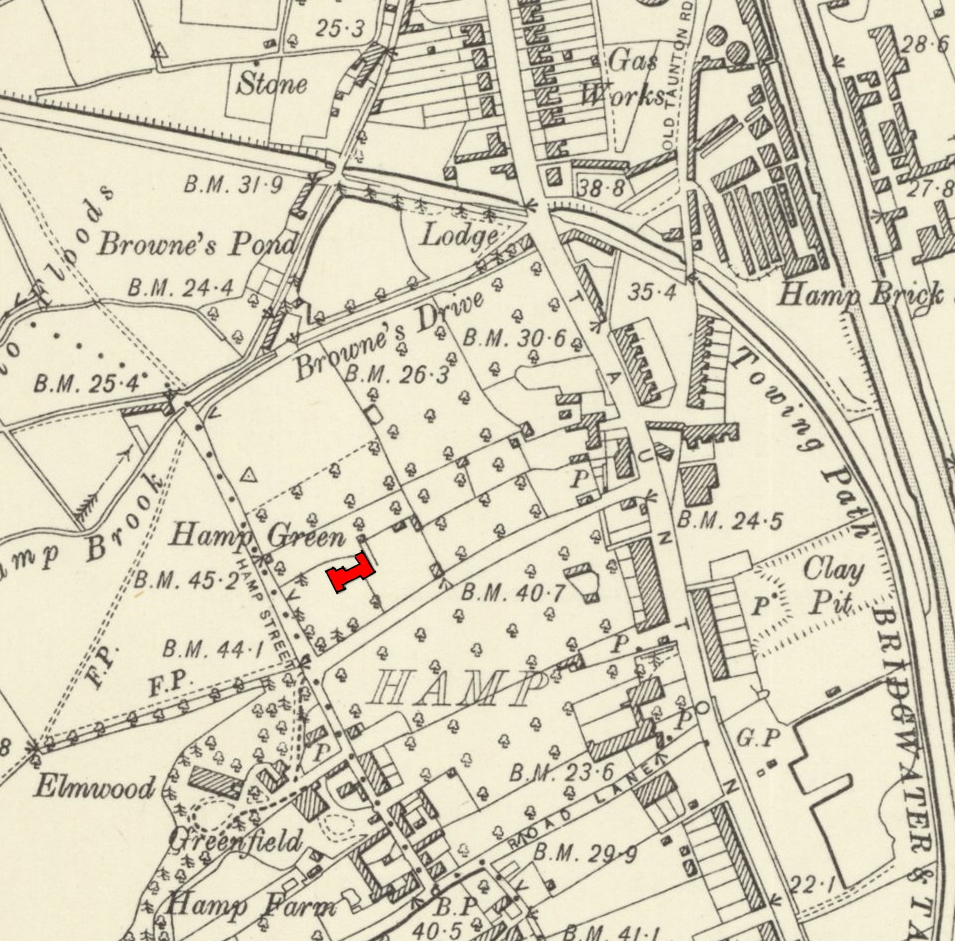
As well as the usual range of domestic ironmongery, pots and pans, nails and screws, hinges, locks etc., sold from the Cornhill shop, they also sold agricultural ironmongery from a branch situated at the west of the town, where the Cattle Market was later to be built in 1877. Newspaper advertisements of the time mention metal fence panels and gates, ploughs, cream separators, little corn mills, etc. On the closure the branch moved to premises in Pricket’s Lane, later Market Street. How long it remained is not yet known.

A highly detailed account his family life can be found in a book by his eldest daughter : Margaret Thompson Sturge, Memories and Echoes of Bygone Days, (1904), on this website.
William Thompson 1837-1927
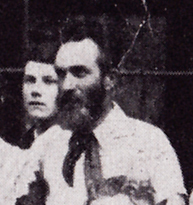
He was the eldest son of Francis Thomson and was born at Street 10 November, 1837. He was educated at Bootham school (Yorks), then entered the family business, eventually becoming sole owner. He married twice: firstly to Agnes M. Fitzroy Stuart, and they had one son and three daughters; secondly to Bessie Lilian Sully, of Bridgwater. They had two sons. He was a committed Friend and was clerk to the Bridgater Preparative Meeting and the West Somerset Monthly Meeting. He was involved greatly in the temperance movement and was a governor of Bridgwater Infirmary.
He was a member of the Borough Council, Mayor in 1901 and 1912, alderman and J. P. He was much concerned with education. From 1882 he served on the School Board, and when responsibility was transferred to the Borough Council, chaired the Borough’s Education Committee
He died at his home Haygrove Cottage, Bridgwater, 21 December 1927. Milligan, p 439

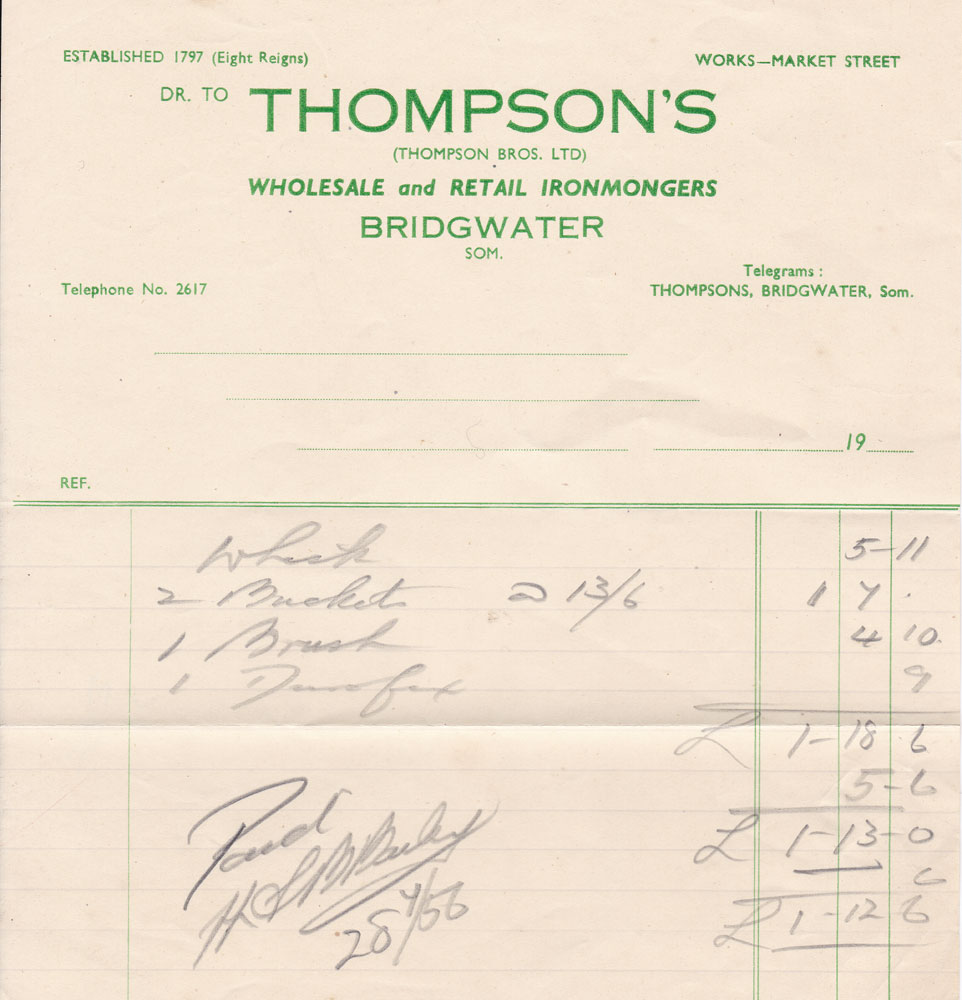
By the beginning of the Great War William Thompson sold the business to a Mr Bond, who had started work at Thompson Brothers in the 1880s and became a partner in the firm. The was probably post 1911 as the census that year described him as an ironmonger and employer. The Bond family owned and ran the business for the next century.
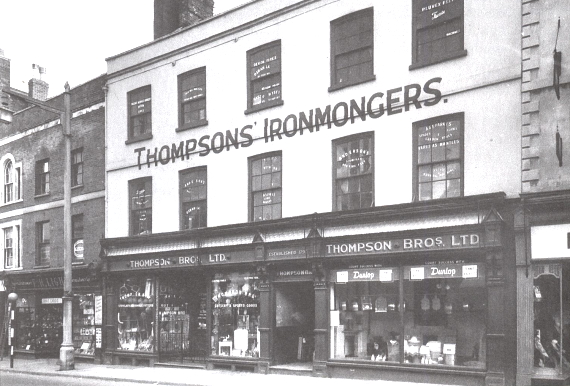
In 1956, the business moved to Market Street, and the Cornhill shop was demolished to become a supermarket. This was because there was a plan to ease bend from Cornhill and St Mary Street: this was the A38 to the SW then.

[?? Was this Market Street site their old Agricultural ironmongery depot??]
The business switched to the old Bridgwater electricity generating station in Mount Street in 1982, the move probably being caused by the wholesale demolition of properties in Market Street for the construction of the Angel Place shopping development. The shop remained at Mount Street until final closure in August 2007. At the time of the closure the business had a small museum of antique ironmongery of the type it once sold – even a mantrap. What became of it is not known. Later the Blake Museum created a small permanent display about the firm – A bicentenary mug. bill-heads, and even ceramic lavatory pulls with the firm’s name, etc.
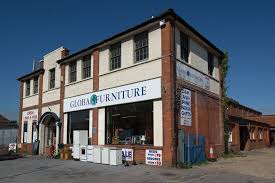
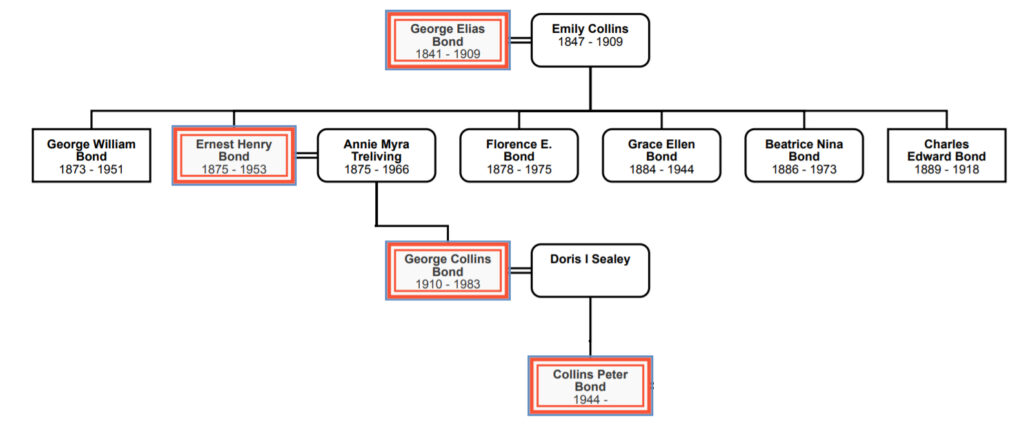
[Perhaps add section about the wider role of the Thompson’s in BW C19 commercial life. CT and Spillers, LT and wholesale grocery, etc??]
Sources:
Edward H. Milligan, British Quakers in Commerce and Industry, 1775-1920, Sessions Book Trust, 2007
The Telegraph
Ironmonger to close after two centuries: Thompson brothers: 21 Aug 2007
When Thompson Brothers first began trading in 1797, the last invasion of Britain had just taken place. But 210 years later, the ironmonger, where man traps, fire irons and gunpowder once sat alongside pots and pans, is preparing to close. The store, in Mount Street, Bridgwater, Somerset, is the latest victim of the relentless march of DIY chains. By the middle of next month all the stock is expected to be gone and with it a testament to a bygone age. When the Thompsons set up their business, French forces which had landed at Fishguard, Pembrokeshire, had just been defeated – the country’s last invasion. Their first shop was on Cornhill in Bridgwater, where locals popped in to buy pans, fire irons and candles, and landowners or their gamekeepers stocked up on mantraps to catch poachers.In 1956, the business moved to Market Street, before switching to its present location in 1982.
Peter Bond, 63, whose grandfather bought the shop from the Thompson family, is preparing to retire in the next few weeks. He said: “This place is the last of its kind of anywhere around here. Shops like Thompson’s are becoming increasingly rare. It’s a shame for our shop regulars because we provide a service to them they can’t find elsewhere. If someone wants a bean cutter, for instance, we stock them. There’s been a lot of support from people plus sadness and annoyance. It’s true some things may be cheaper at the bigger stores but cheapness isn’t always a sign of quality. I am going to retire when we shut. I will find plenty of things to do that I haven’t been able to. We are closing because of the classic problem of trade going to the large stores. I have been with the business for 48 years and when I began we used to have store rooms stocked with everything, including fireplaces and lead. We used to keep gunpowder for the squibbing [the fireworks let off as part of Bridgwater carnival celebrations] but we stopped stocking gunpowder in the Fifties. That was in the Cornhill store. We moved from there and when it was knocked down they found some gelignite in the cellar and my father had to go and retrieve it. The shop is a bit like Arkwright’s store from Ronnie Barker’s comedy, Open All Hours. My office has a museum of the things we have sold from door locks to ball valves. I still have a one man trap in stock. Some things I shall keep and some I will try to place in museums so they are not lost. My grandfather started work at Thompson Brothers in the 1880s and became a partner and, in the early 1900s, he bought it out and since then it has been in my father’s hands and then mine.”
The Dail Mail
Ironmonger closes after 200 years – because DIY chains are taking over
By DAVID WILKES 21 August 2007
When the ironmonger opened for business, King George III was on the throne, Pitt the Younger was Prime Minister, the Napoleonic wars were raging and Nelson had just lost his arm in battle. The year was 1797, and Thompson Brothers sold mantraps – a popular purchase among landowners seeking to catch poachers – as well as less fearsome everyday items like pots, pans and candles. Now after 210 years of continuous trading which have seen it ride immense social changes, the independent shop has finally been forced to shut after becoming the latest victim of the relentless march of national DIY chains.
Manager Peter Bond, 63, said: “It’s a sign of the times. You can’t be individual anymore. “This area is saturated with the sheds like B&Q, as I call them. Being a small firm, particularly in this economic climate, you can’t stand the strain.” The shop in Bridgwater, Somerset, is proud of its history, which father of two Mr Bond has preserved in a mini-museum in his office. There, along with the carpet beaters, old-fashioned weighing scales and oil lamps that were once part of everyday life, can also be seen one of the mantraps that was stocked in bygone days. “It’s a slightly more humane version than you might expect. It has two bars that grip the leg rather than spikes that go into it,” Mr Bond explained. “But once it goes off, it automatically locks and you need a key to open it. It’s not as ferocious as some, but it’d probably break your leg.” Other unusual items he has kept include a wooden shoulder yoke for carrying buckets suspended from chains thought to date from the 1920s and bearing a price tag of 27 shillings and 6d, a pen knife for cutting pen nibs from quills, and rules for measuring the quantity of beer in wooden barrels. These days the stock is, of course, more contemporary, but the shop’s interior retains a period charm. Mr Bond describes it as “a bit like Arkwright’s store from Ronnie Barker’s comedy, Open All Hours.” Its shelves and drawers are crammed with goods, there is an old fashioned till and shop front displays are changed regularly, the latest of which poignantly proclaims: “The end of an era.”
The shop was founded by the two Thompson brothers and first opened at its original location in the town’s Cornhill. Little is known about the brothers, apart from that they were Quakers. It moved premises to Market Street in 1956 where it remained until 1982 when it was compulsorily purchased, necessitating a move to its current, and last, location in Mount Street. Mr Bond’s grandfather started work at the shop in the 1880s, became a partner in the early 1900s, and later bought it out. At the height of its success in the 1940s and 1950s, the shop also comprised a plumbing department, locksmiths, tinsmiths and even a sports department and had a staff of 22.
Today that is down to just five, including Mr Bond, his wife Jennifer, 62, and their daughter Nikki Plummer, 35. “My father ran it before me and I’ve worked here since I was 15,” said Mr Bond, who will retire when the shop closes next month. “I’ve been with the business for 48 years and when I began we used to have store rooms stocked with everything, including fireplaces and lead. “We used to keep gunpowder for the squibbing [the famous fireworks let off as part of Bridgwater carnival celebrations] but we stopped stocking gunpowder in the 1950s. “When we moved from Cornhill they even found some gelignite in the cellar and my father had to go and retrieve it.” That was managed safely, but in the end the explosion of the DIY chains has finished off the old ironmongers. Mr Bond said: “We’re closing because of the classic problem of trade going to the large stores. Everyone wants to sell everything these days and it leaves no room for people like us. “This place is the last of its kind of anywhere around here, it’s a little piece of history. I’ll be sad to see it go.”
Peter Bond. Daily Mail 2007
Daily Mail 2007
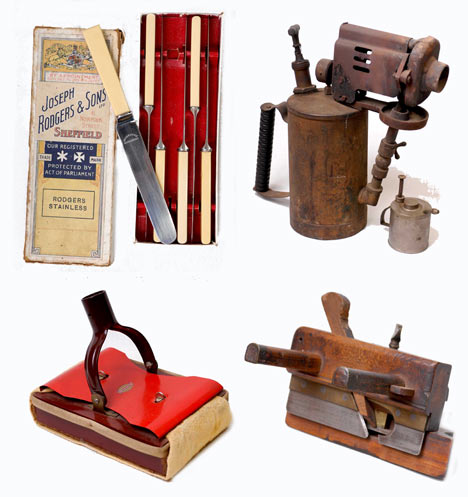
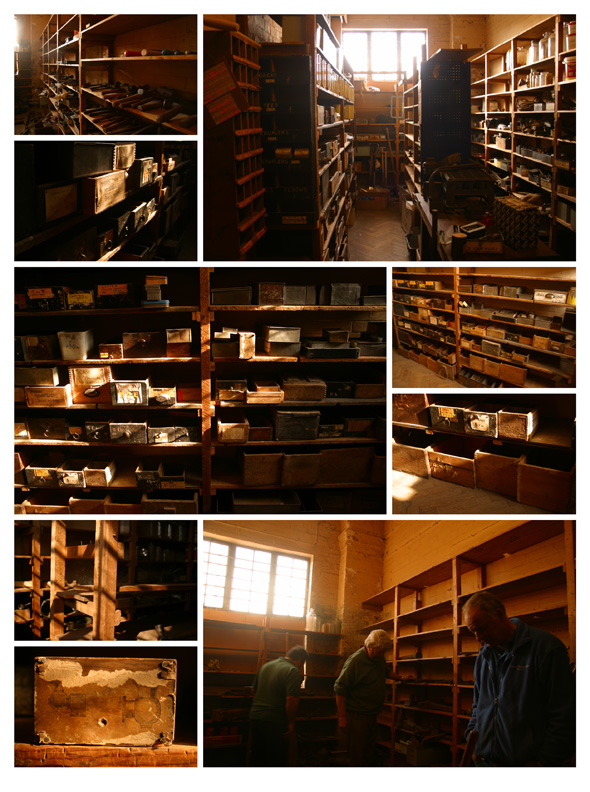
Bridgwater Mercury 2nd March 2007
Plaque commemorates 210 years of business
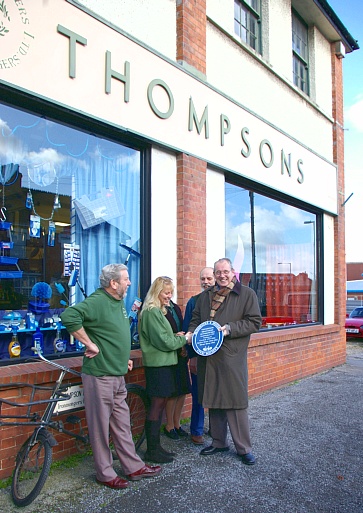
A FIRM that has been supplying goods and services for the buildings of Bridgwater for 210 years has been awarded with a special plaque to mark the achievement. Traditional ironmongers, Thompson Brothers, in Mount Street received the commemorative oval blue plaque on Thursday, from the Bridgwater and District Civic Society. Philip Smeed, chairman of the Civic Society, presented the plaque to Peter Bond, proprietor of Thompson Brothers, at the ceremony also attended by town Mayor Pat Parker. The society has been highlighting the history of the town the series of plaques, funded by the Heritage Lottery Fund. The Mayor said that he was delighted that the Civic Society’s Plaque reminded us all of the endearing contribution the firm has made to the life of Bridgwater. He said: “Succeeding generations over more than two centuries have been faithfully served with unfailing helpfulness.
